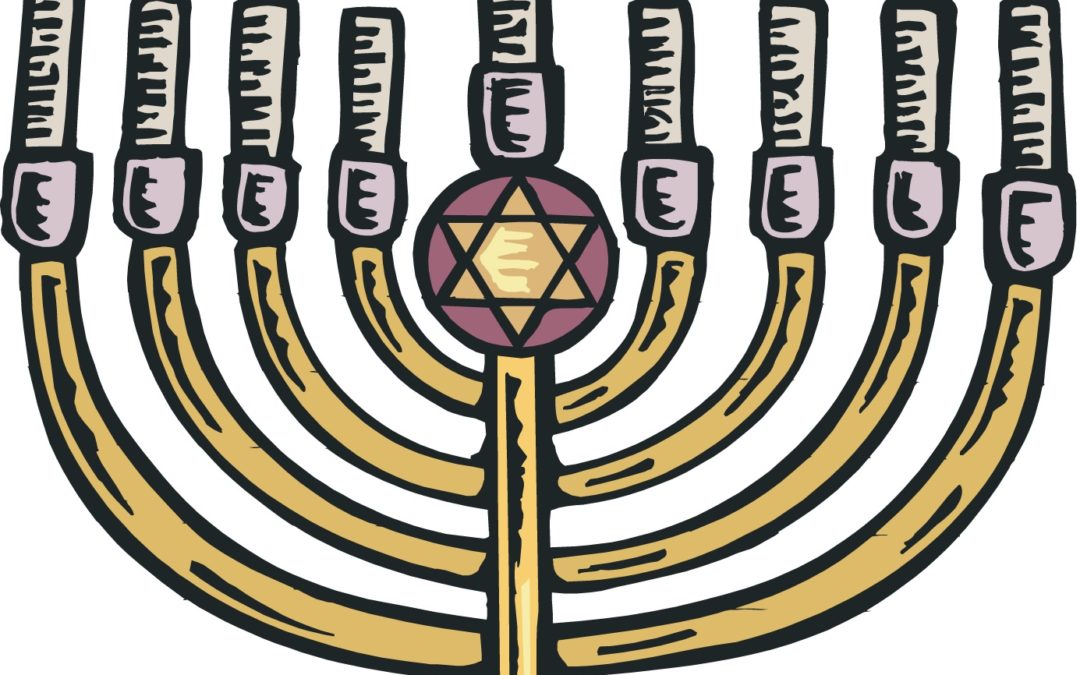The start of Hanukkah got me thinking. How do you craft a story that can last thousands of years? The story of Hanukkah did more than endure. It gave birth to a holiday that connects Jews around the world. It led to new traditions that keep Judaism alive. In other words, it went viral.
Hanukkah, which began on Sunday night, celebrates an event that happened more than 2500 years ago. Antiochus, a powerful and evil Syrian king, tried to make the Jewish people worship Greek gods. He erected a statue of himself in the Jewish temple and the Jews were ordered to bow down before him. Because the Ten Commandments forbid Jews to worship statues or idols they refused.
A small group of Jews called Maccabees rebelled against Antiochus and his minions, and after a bloody three-year war, they recaptured Jerusalem from the Syrians. By then, the temple—the holiest site for Jews– was all but destroyed.
The Jews worked together to clean and repair the Temple, and when they were finished they rededicated it by lighting a small oil lamp.They had only one small jar of oil to fuel the lamp, enough for one day, but miraculously the lamp stayed alight for eight days. That is why Hanukkah lasts eight days.
Hanukkah has all of the elements that make a story great:
- Heroes and villains,
- Conflict and resolution
- A dramatic setting
- Passion, and other powerful emotions
- Universal themes, like loyalty, faith and being true to one’s self
But understanding WHAT makes a story great is much easier than figuring out HOW to make a story great. To explore that, I turned to a master storyteller—Emma Coats, formerly of Pixar, now at Google.
Emma tweeted out 22 rules of storytelling. As my Hanukkah gift to you, I share them below. If you want to learn more about Emma, you can start here.
- You admire a character for trying more than for their successes.
- Keep in mind what’s interesting to you as an audience, not what’s fun to do as a writer. They can be very different.
- Trying for theme is important, but you won’t see what the story is actually about until you’re at the end of it. Now rewrite.
- Once upon a time there was ___. Every day, ___. One day ___. Because of that, ___. Because of that, ___. Until finally ___.
- Simplify. Focus. Combine characters. Hop over detours. You’ll feel like you’re losing valuable stuff but it sets you free.
- What is your character good at, comfortable with? Throw the opposite at them. Challenge them. How do they deal?
- Come up with your ending before you figure out your middle. Endings are hard, get yours working up front.
- Finish your story, let go even if it’s not perfect. In an ideal world you have both, but move on. Do better next time.
- When you’re stuck, make a list of what wouldn’t happen next. Lots of times the material to get you unstuck will show up.
- Pull apart the stories you like. What you like in them is a part of you; you’ve got to recognize it before you can use it.
- Putting it on paper lets you start fixing it. If it stays in your head, a perfect idea, you’ll never share it with anyone.
- Discount the first thing that comes to mind—and the second, third, fourth and fifth. Get the obvious out of the way. Surprise yourself.
- Give your characters opinions. Passive/malleable might seem likable to you as you write, but it’s poison to the audience.
- Why must you tell this story? What’s the belief burning within you that your story feeds off of? That’s the heart of it.
- If you were your character, in this situation, how would you feel? Honesty lends credibility to unbelievable situations.
- What are the stakes? Give us reason to root for the character. What happens if they don’t succeed? Stack the odds against.
- No work is ever wasted. If it’s not working, let go and move on. It’ll come back around to be useful later.
- You have to know yourself: the difference between doing your best and fussing. Story is testing, not refining.
- Coincidences to get characters into trouble are great; coincidences to get them out of it are cheating.
- Exercise: Take the building blocks of a movie you dislike. How do you rearrange them into what you do like?
- You must identify with your situation and/or characters; you can’t just write “cool.” What would make you act that way?
- What’s the essence of your story? The most economical telling of it? If you know that, you can build out from there.
Enjoy your holidays and your holiday stories.


Recent Comments